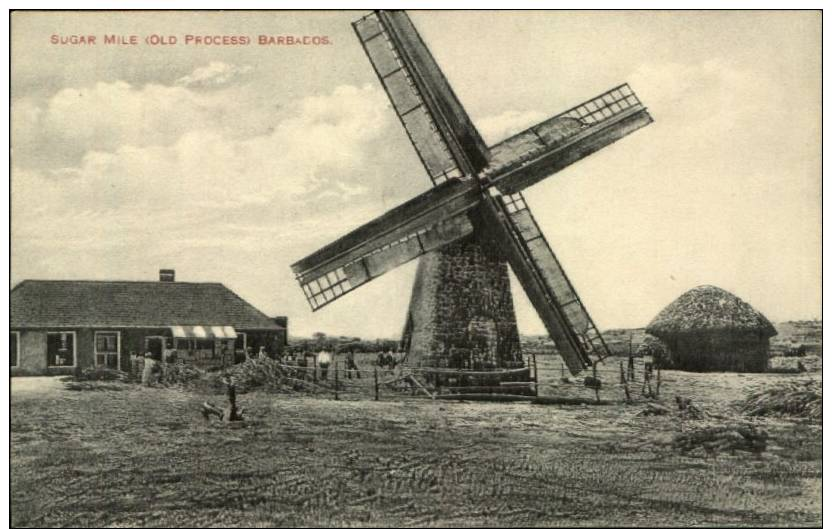
As reviewed by the UK Independent, "The Sugar Barons: Family, Corruption, Empire and War By Matthew Parker," REVIEWED BY Andrea Stuart, on 6 MAY 2011 -- The historian Arcinegas once wrote that the discovery of the New World was as significant as the passing from the third to the fourth day in Genesis. And, as Matthew Parker documents in The Sugar Barons, for 200 years after 1650 it was the wild and lawless islands of the Caribbean, not the more prosaic settlements of the North American mainland, where the drama of that eventful age unfolded. The West Indies, Parker points out, "held out the promise of freedom and opportunities for social mobility unknown in Europe".
The story began on the tiny island of Barbados, about the size of the Isle of Wight, which was the epicentre of the "sugar revolution" in the middle of the 17th century. This saw the establishment of the plantation system, a complex combination of farm and factory never seen before. It was a pivotal historical development, enriching Barbados beyond its wildest imaginings and kick-starting the wholesale cultivation of the sugar crop in the region. Sugar become "the most important commodity in the world", transformed from a rare and expensive substance into a daily necessity.

Sugar became central to the geopolitics of the age, just as steel was in the 19th century and oil is in our own time. It brought Britain colossal wealth and power, as plantation owners transferred profit back to the mother country. Inevitably, the wealth of these sugar magnates translated into political influence and by the middle of the 18th century one aggrieved member of the aristocracy wrote that "the landed interest is beat out... Merchants, nabobs, and those who have gathered riches from the East and West Indies stand the best chance of governing this country".
Anxiety about retaining the golden egg of Caribbean colonies shaped much of Britain's imperial policy. At the end of the Seven Years War, when the French had the choice of keeping either their sugar islands or Canada (which Voltaire dismissed as "a few acres of snow"), they chose the former. Many events – such as how Britain handled the American civil war – can only be understood through comprehending the vital pull of a collection of small islands on the geo-politics of the age.

Life on the islands was so dramatic and tumultuous that it makes our age look as eventful as a mill pond. All of the wider conflicts of the age had reverberations in the region, whether it was the French Revolution or the Napoleonic Wars, while the region generated its own conflict - the rebellion in Saint Domingue and the bloody Maroon war in Jamaica. The islands were also a perfect crossroads of contagion; a high proportion of those who traveled there died of some exotic disease.
In addition, there were a relentless series of natural disasters: hurricanes, earthquakes and tropical storms. This was also the golden age of piracy, when men like Henry Morgan raped and pillaged their way across the region's mythology. As one Baptist minister concluded, these colonies' "whole past history... presents only a succession of infamy, bloodshed, and unmitigated woe, of insecure peace and open disturbance of the abuse of power, and of the reaction of misery against oppression."

Parker's rollercaster of a historical narrative is further enlivened by portraits of colourful characters. Richard Ligon, an Oxford-educated gentleman who provided one of the most vivid account of the early years of Barbados; the adventurer Henry Colt, who modelled himself on legendary "sea dogs" like Raleigh and Hawkins, and related his adventures through the islands; James Drax, the pioneer of sugar production in Barbados, whose dynasty endures to this day; and the Beckfords, the English islands' most successful planters, who amassed their fortune in Jamaica.
So why is it that this fascinating narrative is mainly the preserve of historians and so infrequently dwelt upon in our contemporary popular culture? The answer is straightforward - shame. For the other backdrop of this story is the development of Atlantic slavery: one of the darkest chapters in British history. In the service of sugar, millions of black slaves were made captives, forced to endure the infamous Middle Passage, only to be consigned to a lifetime of enslavement, them and their descendants "in perpetuity".

Bridgetown Barbados Sugar Mill
The colonists grew rich but lived in a state of perpetual anxiety. Their slaves were their closest companions and their greatest enemies. An elaborate series of slave laws evolved in order to manage this ungovernable element. These had the dual purpose of controlling the slaves and justifying the treatment meted out to them. In order to do so the planters of the West Indies instituted a regime of unprecedented brutality.
The slaves nonetheless continued to agitate for their freedom, with a range of tactics from the small to the spectacular. Their efforts were boosted by the rise of the abolitionists, whose agitation in Britain provided a fillip to their dreams of freedom. If I have any quibble with Parker's compelling, wonderful history, it is the lack of these voices. God knows there are few enough of them. Sufficient that even after centuries of silencing, those who want to listen can hear. But this aside, The Sugar Barons is an exemplary book; history as it should be written. (source: UK Independent; Andrea Stuart's 'Josephine: the Rose of Martinique' is published by Pan)


No comments:
Post a Comment